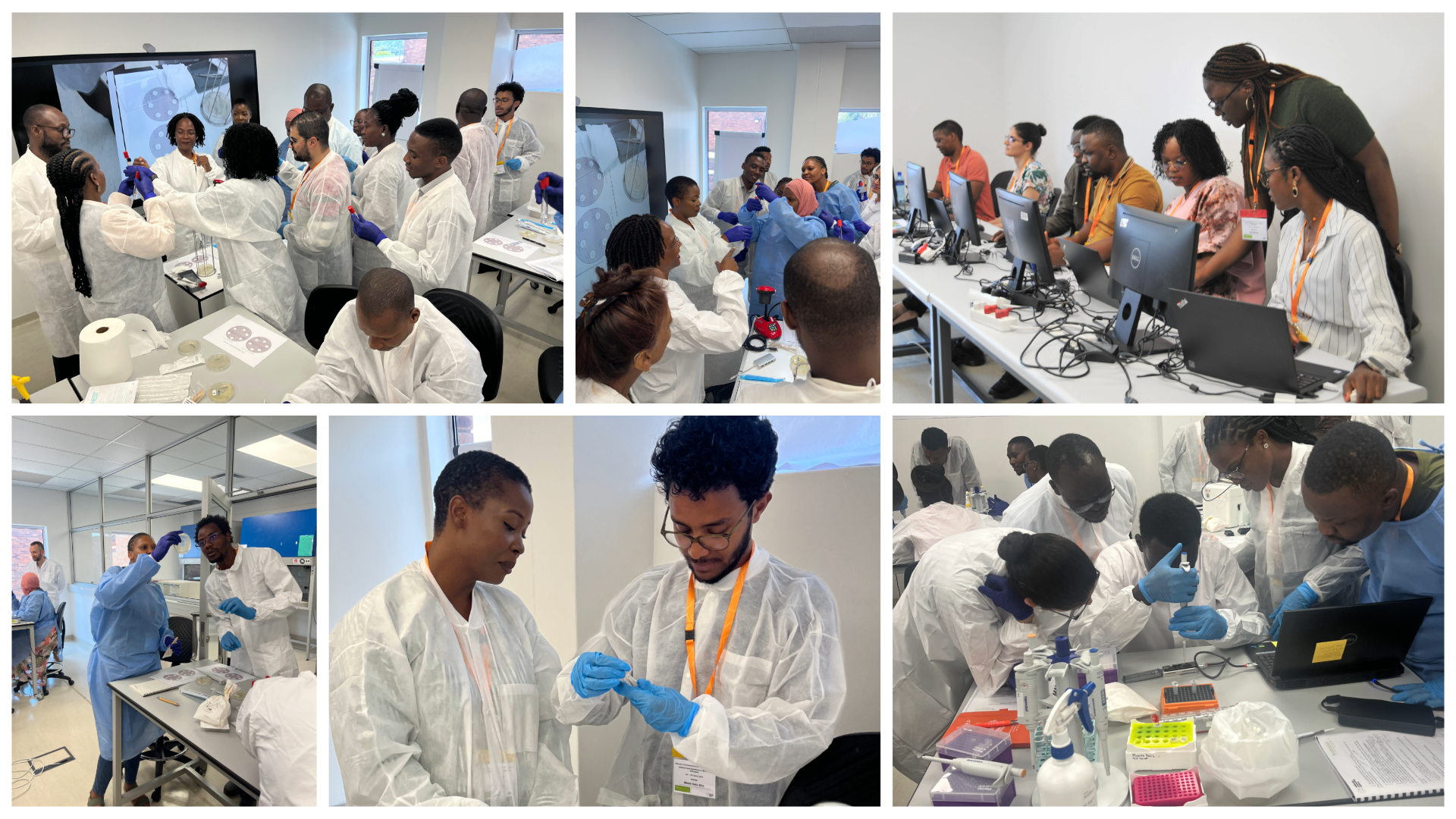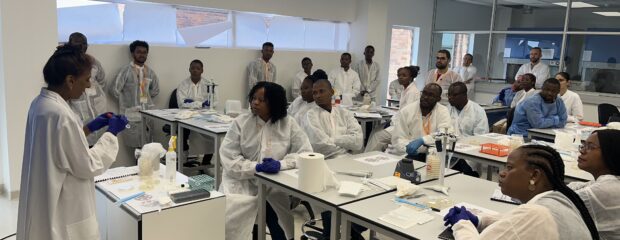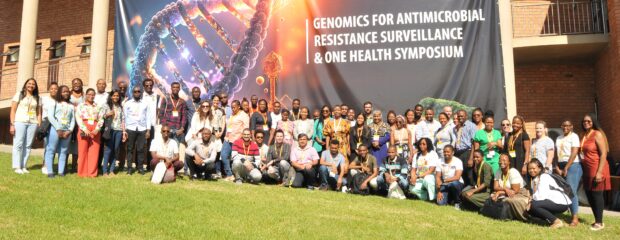
Uniting against antimicrobial resistance in Africa: a collaborative effort to build capacity in genomic surveillance of AMR
Access training activities and networks in Africa, to strengthen your expertise in AMR genomics and surveillance.
The global threat of antimicrobial resistance
Antimicrobial resistance (AMR) poses a serious threat to health, transcending borders and demanding a global response. There is an urgent need for collaboration between scientists working in human, animal, and environmental health sectors to support the acceleration of genomic surveillance, across the globe.
Genomics: an important discipline for addressing AMR
The application of genomics tools and technologies is essential for improving AMR monitoring and surveillance, and informing better healthcare policies and interventions.
This means addressing gaps in genomic surveillance expertise, and the critical shortages of trained professionals in AMR genomics experienced in many counties, is essential for tackling AMR on a global scale.
The challenge of the genomics education gap in Africa
At Wellcome Connecting Science, we know from our work across the globe that scientists in many countries face multiple barriers to accessing the genomics training and community networking needed to build capacity in AMR surveillance.
Through our connections, we understand that training and travel costs make it difficult for scientists working in Africa to come together to share knowledge and collaborate – leading to isolation, and an absence of population data from Africa informing the broader global AMR position.
What is Connecting Science doing to bridging the genomics skills gap in Africa
To address these challenges, Connecting Science delivers hands-on training in Africa; working with leading African scientists and institutions to focus on the application of genomics techniques, to meet the needs of researchers and public healthcare professionals working on AMR surveillance.
Our key aim is ensuring our training activities are tailored to address regional healthcare challenges, and focus on the skills gaps and priorities identified by the scientists we are working with.
What Connecting Science offers:
- Expert-led training: develop essential expertise using the latest genomic tools and technologies through our tailored courses.
- Collaborative networks: join a community of experts sharing best practices and data, enhancing the collective global response to AMR.
- Continued support and engagement: participate in discussion with global leaders and policymakers to further develop your expertise and discover what is going on in AMR genomics and surveillance across Africa and beyond.

I work in a sequencing laboratory back home in Zambia. I have worked with viruses, and they are easy! It’s not complicated like bacteria. Attending this training course helped me to build capacity to manage my work as a person trying to start an AMR programme in Zambia. It also allowed us to network. Not everyone has the capacity to do genomics because it’s expensive, but if we collaborate as African scientists, we will be able to do more genomic testing.
Dr Doreen Shempela, course participant, Zambia
Building scientific communities for continued learning and support
In March 2024, together with the National Institute for Communicable Diseases (NICD), in Johannesburg, South Africa, we co-organised the first symposium focused on implementing Genomics for Antimicrobial Resistance Surveillance and One Health.
Dr Alice Matimba, Head of Training and Capacity Building, Wellcome Connecting Science, discusses the benefits and impacts of the AMR symposium.
Watch this video to find out more about the AMR symposium in Africa
What was the AMR symposium designed to achieve?
Scheduled to begin the day after our Antimicrobial Resistance in Bacterial Pathogens course finished, the symposium was designed to provide an environment for trainees to build upon the momentum developed during their training. Over 50 course participants, representing 20 African countries, joined the symposium to explore real-world application of their newly acquired skills and knowledge, to support public health decision making.
Key impacts from the symposium:
- A platform to discover cutting-edge research.
- A catalyst for discussion on data-sharing and governance.
- Exemplified the power of collaboration for strengthening genomics capacity.
Participants received training from scientists who came from across the globe. The aim of the course was to provide training across many different aspects of AMR. Firstly, in the experimental methods that are required for detecting resistance, and the importance of quality control in ensuring that data is of a high-quality standard. It also provided training on the basics of genome sequencing for AMR. Participants learnt how to track bacterial pathogens in genes, understand resistance mechanisms, and use genomic data to provide new insights
Dr Ewan Harrison, Group Leader, Wellcome Sanger Institute
SAGESA: a training and research network to help develop genomics capacity in Africa
At the symposium, our SAGESA members (a virtual community we support of over 400 scientists based in Africa), came together in-person for the first time, fostering deeper relationships, exchanging ideas, and strengthening collaborations.
I made key connections at this in-person symposium with representatives from organisations our funders recommended we collaborate with. This opened the door to faster project progress through easier initial informal meetings and discussions around collaboration. I would not have made the same connections had this symposium been delivered in a virtual format
Dr Sylvester Moyo, African Society for Laboratory Medicine (ASLM), Ethiopia
Stay in touch about all our training and networking opportunities in AMR genomics in Africa
Complete the form below to stay informed about new opportunities to join our scientific communities in Africa.
Sign up and join the collective action to tackle AMR!
Article contributors
Alice Matimba, Head of Training and Capacity Building, Wellcome Connecting Science, UK
Isabela Malta, Global Training Assistant Manager, Wellcome Connecting Science, UK
Catherine Holmes, Marketing and Communication Manager, Wellcome Connecting Science, UK
Vuyo Sabani, Acting Senior Communication Manager, National Institute for Communicable Diseases, South Africa
Mandy Tsotetsi, Communication Manager, National Institute for Communicable Diseases, South Africa
Image credits: Wellcome Connecting Science, UK and National Institute for Communicable Diseases, South Africa


